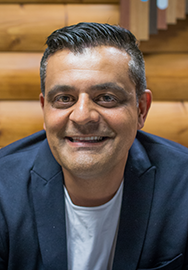
Interview with Manu Varma, People Person/VP of HR, Traction on Demand
|
Manu Varma, People Person/VP of HR, Traction on Demand bh in BriefTraction is a consulting and cloud software development firm with unparalleled expertise in using the Salesforce.com platform to improve business processes. We do this to make people more efficient, to eliminate redundancy and ultimately increase our customer’s bottom line. We are experts in bending cloud based technologies to enhance our clients’ sales, marketing, customer support, data and operations offerings.
tractionondemand.com
|
Manu Varma is an HR professional with over 15 years of experience in high tech, utilities and finance around the world. He is People Person at Traction on Demand, a certified B Corp and award winning leader in creating a positive work environment for its employees. Since one of the main goals of B Corps is to redefine success in business, bh asked Vanu to comment on future directions in HR. 1. What are key people practices for an age of innovation?Three key people practices for me are: Get rid of policies – Move away from policy driven environments. I hate how HR has this reputation for being the policy police. Traditional companies, “CYA” all the time by referencing edge cases to then paint all employees with overarching policies. If we treat employees like children, they will respond like children. Trust first. People first. That is what motivates and drives people to innovate. If we can provide an environment that champions failing fast, innovation follows. Recruit based on culture fit – Re-imagine what an innovative worker looks like. Hire based on WHO people are, rather than the skills they bring to the table, so that innovative thought leadership can emerge. We can always teach someone how to be a good business analyst, project manager, developer etc., but what we cannot teach is humility, a work ethic, and the drive to succeed. Leverage technology – Use data and technology to make decisions. Avoid policy driven decision making. 2. How is technology changing people practices?Technology SHOULD be changing people practices. Sadly, most folks in HR are not embracing technology; it seems they are afraid to embrace change. Technology helps us succeed or fail faster; so its business side is equally important. Through most of my career, I have had to “work” around in technology solutions as there was never a big enough budget for “HR” related things. With a platform that provides a full 360 degree view of an employee life cycle – start to finish – we can make decisions that are in the best interest of the employee AND the company. 3. As demographics change, does employee engagement change?I believe the values that underlie engagement stay the same, but the behaviour those values manifest changes over time. As we evolve and age, we all have different constraints on our time, different responsibilities and different concepts of family. As a parent, I want flexibility to take my kids to soccer; as a caregiver for an aging parent, I want compassion and empathy. My engagement evolves. What kept me engaged at work in my twenties is not the same thing that keeps me engaged in my forties. What is consistent, are my values and the motivation behind them. I still want my voice to be heard. I still want to be appreciated. I still want to make a difference. 4. What is different about a B Corp? Is it a model for the future?B Corps redefine how businesses judge success. People and the environment are equal to profit. They are not about corporate responsibility, but about corporate social integration. I encourage all businesses, not to simply get certified, but to encourage other businesses to re-imagine how to define success. Of course, numbers have to add up, but how attention and resources are allocated can drastically affect how the business community at large treats its own people, the communities they work in, and the collective environment. B Corps are concerned not only about sustainability and conversation, but also full empowerment for all people. Being a B Corp is our moral compass when selecting vendors and partners. During the RFP process we ask if candidates are B Corps. If they are, it opens up a new dialogue that helps us create a whole new business model. 5. As we celebrate Canada 150, what advice do you have for others?In summary, I advise others to trust people and put them first. Re-imagine what an innovative worker looks like and focus on who people are. Wherever possible, embrace technology, welcome the changes it brings and use it to make decisions in the best interest of your employees, your company and your community. Going forward, re-consider how you judge success and, when necessary, be willing to adopt a new, more empowering, more sustainable way of doing business. bh |

